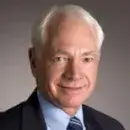
Professor
Claude R. Canizares
Massachusetts Institute of Technology
Astrophysicist; Educator; Academic administrator
Area
Mathematical and Physical Sciences
Specialty
Astronomy, Astrophysics, and Earth Sciences
Elected
2004
Canizares is the Bruno Rossi Professor of Physics at the Massachusetts Institute of Technology. He has served as Vice President (2013-2015), Vice President for Research & Associate Provost (2006-2013), Associate Provost (2001-2006), and Director of the Center for Space Research (1990-2002). He is a principal investigator on NASA's Chandra X-ray Observatory and Associate Director of its science center. His main research interests are high-resolution spectroscopy and plasma diagnostics of cosmic X-ray sources including active stars, black-hole or neutron star binaries, supernova remnants, quasars and clusters of galaxies. His service outside MIT has included the Department of Commerce’s National Advisory Council on Innovation and Entrepreneurship and the National Research Council’s (NRC) Committees on Science, Technology and the Law and on Federal Regulations and Reporting Requirements. He served as chair of the NRC’s Space Studies Board and was a member of the NASA Advisory Council, the Air Force Scientific Advisory Board, and the board of the Associated Universities, Inc., among others. He served as a member of the L-3 Technologies, Inc. (now L3Harris) Board of Directors (2003-2019). He currently serves on the Hubble Space Telescope Institute Council (STIC), NRC’s Air Force Studies Board, and chairs the Audit Committee of the National Academy of Sciences among others. Professor Canizares is a member of the National Academy of Sciences and the International Academy of Astronautics and is a fellow of the American Academy of Arts & Sciences, the American Physical Society, and the American Association for the Advancement of Science. He received several awards including Decoration for Meritorious Civilian Service to the United States Air Force, the Goddard medal, the Basic Sciences Award of the International Academy of Astronautics, and two NASA Public Service Medals.
Last Updated